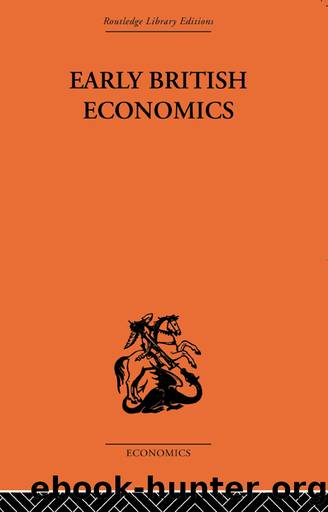Early British Economics from the XIIIth to the Middle of the XVIIIth Century by Beer Max;

Author:Beer, Max; [M. Beer]
Language: eng
Format: epub
ISBN: 1542919
Publisher: Taylor & Francis Group
2. Rise of the term âBalance of Tradeâ
Out of the proposals of the merchants, and not of those of the scholars and statesmen, arose the balance of trade doctrine. The term was gradually evolved in the first fifteen years of the seventeenth century.
The terms âbalancingâ and âbalanceâ were known to book-keepers in the second half of the sixteenth century. They signified âreckoningâ up the columns debitor and creditor and bringing âconcordanceâ between them. In that sense they are used by John Mellis, a schoolmaster in Southwark, in his Briefe Instruction and Manner how to keepe books of Accounts after the order of Debitor and Creditor. The booklet was published in 1588 and is still worth reading by economic historians. There is no pagination, but short numbered chapters. The above-mentioned terms are to be found in chapters 10, 21, 22. Mellis knew also the term âcapital,â but only in the sense of a stock of commodities, with the exclusion of money, which, in book-keeping, Mellis called Capsa, a chest. Capsa and capital formed two opposite columns.
It is probably from book-keeping that those terms were transferred to mercantilist writings, since up to the middle of the seventeenth century mercantilist writers were merchants.
As mentioned in a previous chapter, Queen Elizabeth appointed in 1600 a commission to enquire into the money difficulties of the realm. The commission consisted of Alderman Sir Richard Martin and eleven other members, among them Gerard Malynes. In the spring of 1601, the commission reported that the cause of the large export of treasure and smaller import thereof was due to: (i and ii) overheaviness of the gold coin and overrichness of the other coins; (iii) disproportion of the value of our gold and silver (our ratio being 11:1 and abroad 12: 1); (iv) overbalancing of imports above our exports; (v) abuse of exchange between us and other nations; (vi) neglect of home manufacture. âTouching the abuse of exchange, which rises and falls according to the plenty and scarcity of money, we find that when the price of exchange is low here, so that more will be given for our money in specie than can be had for it beyond the seas by bill of exchange, then our monies are exported. It is also thought that by this abuse of the exchange exports must decrease and imports will increase. As for remedies, some think that the exchange for all places to be kept at a certainty, according to the value of the coin current. For the redress of excessive imports, we think that the Statute of Employment should be put in execution.â1
The full term âbalance of trade,â however, appears to have been employed for the first time in 1615. In that year two customs officers, Sir Lionel Cranfield and Sir John Wolstenholme, reported on the export and import of the preceding ten years. Cranfield's report was endorsed on May 21, 1615, with the following words: âSir Lionel Cranfield his Ballance of Trade.â2
In 1616, Francis Bacon, in a paper entitled âAdvice
Download
This site does not store any files on its server. We only index and link to content provided by other sites. Please contact the content providers to delete copyright contents if any and email us, we'll remove relevant links or contents immediately.
International Integration of the Brazilian Economy by Elias C. Grivoyannis(74623)
The Radium Girls by Kate Moore(11619)
Turbulence by E. J. Noyes(7700)
Nudge - Improving Decisions about Health, Wealth, and Happiness by Thaler Sunstein(7240)
The Black Swan by Nassim Nicholas Taleb(6762)
Rich Dad Poor Dad by Robert T. Kiyosaki(6174)
Pioneering Portfolio Management by David F. Swensen(6078)
Man-made Catastrophes and Risk Information Concealment by Dmitry Chernov & Didier Sornette(5645)
Zero to One by Peter Thiel(5488)
Secrecy World by Jake Bernstein(4388)
Millionaire: The Philanderer, Gambler, and Duelist Who Invented Modern Finance by Janet Gleeson(4092)
The Age of Surveillance Capitalism by Shoshana Zuboff(3983)
Skin in the Game by Nassim Nicholas Taleb(3965)
The Money Culture by Michael Lewis(3846)
Bullshit Jobs by David Graeber(3826)
Skin in the Game: Hidden Asymmetries in Daily Life by Nassim Nicholas Taleb(3720)
The Dhandho Investor by Mohnish Pabrai(3560)
The Wisdom of Finance by Mihir Desai(3523)
Blockchain Basics by Daniel Drescher(3327)
